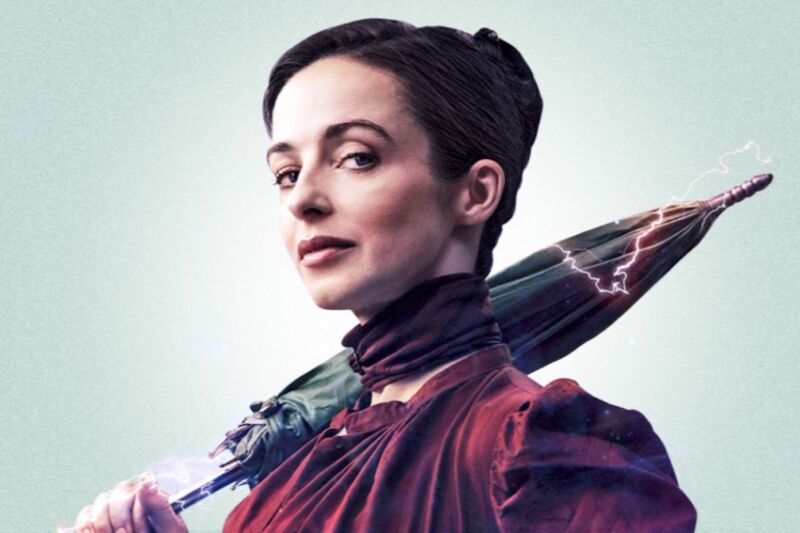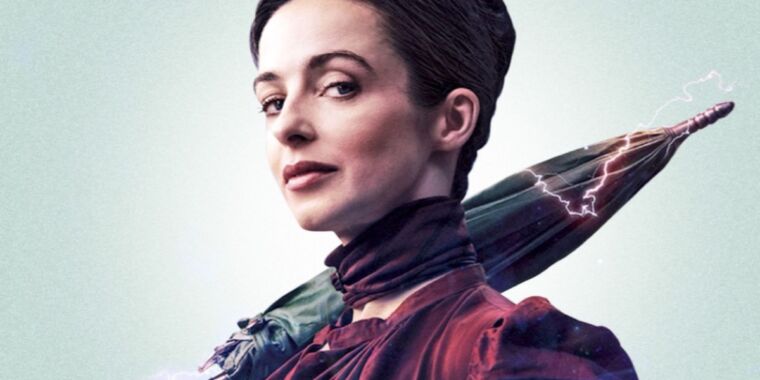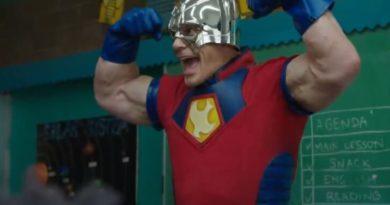Review: The Nevers makes abrupt turn in disorienting midseason finale
[ad_1]

I’m not sure what I was expecting from the midseason finale for The Nevers, HBO’s inventive and alluring science fiction drama set in Victorian England. But I certainly didn’t foresee being so disoriented that I briefly wondered if HBO Max had started airing an entirely different series by mistake. I won’t spoil the finale for you, but let’s just say that the revelations in that sixth episode set up a radical new direction for the series. I’m curious to see if the writers can stick the landing when the second half of the season eventually airs.
(Some mild spoilers below, but no major reveals.)
As I’ve written previously, HBO won a fierce bidding war and approved a straight-to-series order in 2018, with Joss Whedon (The Avengers, Cabin in the Woods, etc.) as writer, director, executive producer, and showrunner. Whedon brought Douglas Petrie and Jane Espenson—both of whom worked with Whedon on Buffy the Vampire Slayer—on board as additional writers/executive producers. Last November, Whedon announced he was quitting the project, citing exhaustion and the “physical challenges of making such a huge show during a global pandemic.” British screenwriter Philippa Goslett (Little Ashes, How to Talk to Girls at Parties) took over as showrunner soon after.
Per the official premise:
August, 1896. Victorian London is rocked to its foundations by a supernatural event which gives certain people—mostly women—abnormal abilities, from the wondrous to the disturbing. But no matter their particular “turns,” all who belong to this new underclass are in grave danger. It falls to mysterious, quick-fisted widow Amalia True (Laura Donnelly) and brilliant young inventor Penance Adair (Ann Skelly) to protect and shelter these gifted “orphans.” To do so, they will have to face the brutal forces determined to annihilate their kind.
The pilot opens three years after whatever inexplicable event led to the emergence of the extraordinary abilities of the “Touched.” Amalia and Penance are working with a wealthy spinster named Lavinia Bidlow (Olivia Williams), who runs the Orphanage, a haven for the Touched.
They include Annie Carbey (Rochelle Neil), aka Bonfire, who can control fire; Dr. Horatio Cousens (Zackary Momoh), who has the gift of healing; Primrose Chattoway (Anna Devlin), who stands 10 feet tall; Myrtle Haplisch (Viola Prettejohn), who has lost the ability to speak any language other people can understand; Mary Brighton (Eleanor Tomlinson), a singer who must find her voice to inspire hope across the city; Kiran Sonia Sawar as Harriet Kaur, a Scottish Sikh and aspiring lawyer whose breath can turn any substance into glass; Elizabeth Berrington as the streetwise and superstrong Lucy Best; and Desirée Blodgett (Ella Smith), a prostitute with a young mute son.
Naturally there are those who fear the Touched, such as London aristocrat Lord Massen, played by Pip Torrens (so memorable as Herr Starr in Preacher), who thinks they are an aberration of nature and a threat to the social order. Some of the Touched are criminally inclined and often dangerous, most notably the mentally unstable Maladie (Amy Manson), who embarks on a vicious killing spree and thereby gives Massen and his allies precisely the political leverage they need.
Caught in the middle is Detective Frank Mundi (Ben Chaplin, The Thin Red Line), tasked with trying to capture Maladie. His discomfort with the Touched is complicated by his past relationship with Mary (who left him at the altar before she was Touched) and by hints of his fluid sexuality. James Norton plays Hugo Swan, a pansexual aristocrat who owns a private underground club and sees the Touched as a veritable gold mine for exploitation. (The obligatory HBO sexposition scene takes place in his club, of course.)
-
Amalia True (Laura Donnelly) is responsible for mentoring those with unusual abilities, known as the “Touched.”
-
Her BFF and partner in this endeavor: Penance Adair (Ann Skelly).
YouTube/HBO -
A mysterious sighting over London serves as the triggering event for the Touched.
HBO -
Mary Brighton (Eleanor Tomlinson), a struggling singer, finds herself Touched.
YouTube/HBO -
Lavinia Bidlow (Olivia Williams) is a wealthy spinster who runs an orphanage for the Touched.
YouTube/HBO -
Dr. Horatio Cousens (Zackary Momoh) is an ally to Amalia, as well as being Touched with healing powers.
YouTube/HBO -
Lord Massen (Pip Torrens) views the Touched as a menace to polite society.
YouTube/HBO -
Hugo Swan (James Norton) is an aristocrat who views the Touched as a potential gold mine.
YouTube/HBO -
Another one of the Touched: Primrose Chattoway (Anna Devlin) has grown to 10 feet tall.
YouTube/HBO -
Giving the Touched a bad name: Maladie (Amy Manson) is an unstable serial killer.
YouTube/HBO -
Ben Chaplin plays Detective Frank Mundi, who is hunting Maladie.
YouTube/HBO -
Annie Carbey (Rochelle Neil), aka Bonfire, can manipulate fire, which makes her handy in a fight.
HBO -
Penance is able to sense and manipulate electric fields, making her a technological whiz.
HBO -
There’s some snazzy-looking steampunk-esque technology.
YouTube/HBO -
Nick Frost plays Declan Orrun, aka the Beggar King.
YouTube/HBO -
Deranged surgeon Edmund Hague (Denis O’Hare) hopes to discover the source of the abilities of the Touched.
YouTube/HBO -
Check out that hand cannon.
YouTube/HBO -
Mary finds her voice with a song only the Touched can hear.
HBO -
Regrouping after an unexpected loss.
HBO -
Amalia and friends are dejected.
YouTube/HBO -
Facing an unknown future, together.
HBO
The cast also includes Nick Frost as Declan Orrun, aka the Beggar King, an amoral criminal overlord who helps Amalia when it suits him, yet is more than happy to help out Massen as well if the price is right; Denis O’Hare as unhinged surgeon Dr. Edmund Hague, who longs to discover the source of these unusual abilities; and Tom Riley as Augie Bidlow, Lavinia’s geeky younger brother, who is secretly Touched and romantically drawn to Penance.
The Nevers works on multiple levels: it boasts a unique premise, multiple compelling storylines, lavish production design, and thematic heft. Best of all, it’s packed with terrific, memorable characters, brought to vivid life by an insanely talented cast. Standing above all the rest is Laura Donnelly, who is simply extraordinary as Amalia. Whedon described Donnelly as both “fierce and funny”—attributes essential for the role. But Amalia is also equal parts tough and vulnerable, loyal yet capable of betrayal if her mission requires it. She drinks hard, has sex with men and doesn’t bother learning their names, and is formidable in a fight, despite her diminutive stature. And her friendship with Penance is the heart and soul of the series. Donnelly brings all of that to the role, and more.
The Nevers isn’t a perfect series. It’s complicated and can be confusing, especially as it keeps adding characters and subplots. Let your attention wander for a moment and you’ll likely miss some tiny detail that will prove crucial to understanding a plot point later. This is especially true of the abrupt shift in the midseason finale, which dumps viewers into a brand-new world with brand-new characters, midaction, leaving them to flounder their way to some understanding of what is going on.
I get the desire to play cards close to the vest to maximize the shock value of that megatwist, but with The Nevers, the writers sacrificed clarity on the altar of surprise. I’m not convinced that surprise was necessary, given that the execution is so sloppy. Plenty of other equally complex shows out there still manage to be reasonably clear about what’s going on. That said, the strengths of The Nevers far outweigh the weaknesses. I’d rather watch an ambitious show that swings for the fences and falls short than one that opts to play it safe.
The first six episodes of The Nevers are now streaming on HBO Max. The COVID-19 pandemic interrupted production, so S1 was expanded to 12 episodes and split into two parts. The remaining six episodes will be aired at a later date, hopefully this year, although Donnelly recently said in an interview that production hasn’t even begun on the second half of the season yet. (Be warned: major spoilers run throughout the linked interview.) Hopefully those episodes will tie all the threads together and bring some resolution to the many, many questions left unanswered.
[ad_2]
Source link




